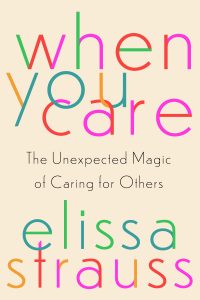

Elissa Strauss has been writing about the politics and culture of parenting and caregiving for more than fifteen years. Her work appears in publications like the Atlantic, the New York Times, Glamour, ELLE, TheWeek.com and elsewhere, and she was a former contributing writer at CNN.com and Slate, where her cultural criticism about motherhood appeared on DoubleX. Here, I ask her about her new book, “When You Care: The Unexpected Magic of Caring for Others,” which is out now from Gallery Books. You can find out more about Elissa at her website. And you can follow her on Twitter @elissaavery
AMW: How has our cultural emphasis on independence and self-reliance led to a caregiving crisis? And what does that crisis look like?
ES: Allow me to take you back with me to my 11th grade English class. I remember the moment our teacher read us Henry David Thoreau, the way her voice deepened and her spine straightened. We were, these physical changes implied, about to confront deep truths about the very nature of life. Pay attention!
Now, I don’t want to pick on Henry here, or discount his many worthy observations…that said, so much of our anti-care, anti-dependency culture can be traced back to this book and his reputation as a real American truth-teller ever since. Thoreau, who found it “wholesome to be alone;” who believed that a “man is rich in proportion to the number of things which he can afford to let alone;” who left his home and family and “went to the woods because I wished to live deliberately, to front only the essential facts of life, and see if I could not learn what it had to teach, and not, when I came to die, discover that I had not lived.” If I could wave a magic wand, I would make it so Henry wrote a book about the magic of independence and going away from home and his sister, let’s call her Henny, wrote a book about the magic of dependency, and staying put and raising children or caring for her parents with dementia. “A woman is rich in proportion to the number of things which she can not afford to let alone.” Imagine if we also read that in 11th grade English, and it was presented as another, equally important path to finding deeper truths. Imagine how we would value care!
We don’t have support for caregivers because we don’t value care down to our very core. We don’t value care in practical, economic or political terms. And we don’t value it in psychological, philosophical or spiritual terms, as individuals or a collective—it is simply, sadly, not part of the bigger story we tell ourselves about what it means to be a human and live a meaningful life. In my book I look at how that happened, and how that can change. Though I want to be abundantly clear that I don’t think care and dependence are only for women and solitude and independence are only for men. The dream is for both ways of being to be seen by society as equally valuable and fertile–and for people to embrace them no matter their gender identity.
AMW: How can care transcend mere practicality and enrich our lives with meaning, purpose, and a deeper connection to others?
ES: One of the big problems now is that many people are so overwhelmed by the practical demands of care–inevitable in a country that fails to support parents and caregivers and expects them to do everything on their own –that they lack the bandwidth to fully experience the emotional richness of care. This makes me so mad! So many of us are stuck in a battle to make care practically possible, that we don’t get to experience it in all its fullness.
That said, we owe it to ourselves to try to find those moments of epiphany, metamorphosis and transcendence in care, which is one of the richest experiences humans can have. Also, doing so can make the experience more meaningful and even enjoyable. The important of attention, and truly seeing another, has long been held up as an essential component of living an ethical life. Except, surprise, for a long time philosophers didn’t see this in the context of care. Really, is there anywhere the need to really see another, understand them, and anticipate their needs is more essential or complex than in parenting and caregiving? Having someone dependent on us, really puts us to the test- are we able to break through our subjective reality and make space for another? Or, keep on insisting their is one way to live, one way to experience the world, and we have it all figured out.
Or, let’s take spirituality. Care offers us so many opportunities to connect with something we may call divine, the force of life, the mystery of it all. We are, according to the bible, made in the image of God. Why not see our moments of care as important, spiritually and theologically, as going to church or volunteering for the need outside the home. As one source I spoke to for the book said, sometimes the needy are in our home! And yet, those who give to their families, people they can’t walk away from, have never been held up as saints or the righteous. It’s bananas.
AMW: How can we address issues of gender equity within the context of care?
ES: This is a one-two policy and culture change punch. We have many examples of one being not enough; dads were offered paid leave but didn’t take it because they would be punished at work, or dads trying to do more but being held back by a lack of structural support.
In my book I focused on a few things when it comes to men and care. First of all, men can care, they also have the neurological wiring to experience pleasure from giving care, and care changes them physiologically. Indeed, as much of this research shows, we don’t care because we love. We love because we care.
Second, men still do not do enough care for children or ill, older or disabled people, but they are doing way more than their fathers or grandfathers did. Also, many of them like it. They report it to be meaningful and a big part of their identity. But they do need our support because many of them were not raised with training on how to care like girls are.
I hope my book helps men see care as more than an obligation, and, ideally, more than a right. I hope my book helps men see care as an opportunity. Something that could expand their horizons and add meaningful complexity to their lives, if they’d only let it.
Alicia M. Walker is Associate Professor of Sociology at Missouri State University. She is the current editor of the Council of Contemporary Families blog. Follow her on Twitter at @AliciaMWalker1.

Comments